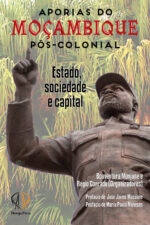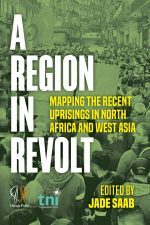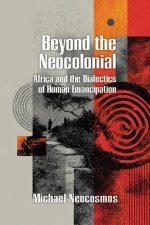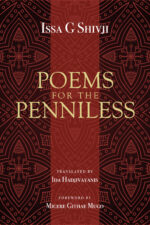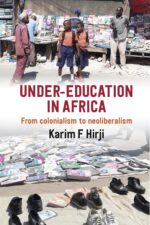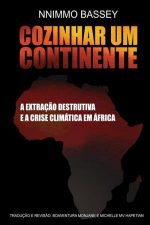-
Mau Mau From Within: The Story of the Kenya Land and Freedom Army
USD $ 12.00 USD $ 30.00Price range: USD $ 12.00 through USD $ 30.00Select options This product has multiple variants. The options may be chosen on the product pageMau Mau From Within: The Story of the Kenya Land and Freedom Army
USD $ 12.00 USD $ 30.00Price range: USD $ 12.00 through USD $ 30.00The inside story of the struggles of the Kenya Land and Freedom Army, referred to by British colonialism as the ‘Mau Mau rebellion’, is little known today. The autobiographical material written by Karari Njama (a senior leader in the Mau Mau hierarchy) and compiled by Donald L. Barnett was first published by Monthly Review Press in 1966 as Mau Mau From Within: An Analysis of Kenya’s Peasant Revolt. It was reprinted in 1970; it has remained out of print for many years. As the late Basil Davidson put it in his review of the first edition: “Njama writes of the forest leaders’ efforts to overcome dissension, to evolve effective tactics, to keep discipline, mete out justice … and to teach men how to survive in those merciless forests. His narrative is crowded with excitement. Those who know much of Africa and those who know little will alike find it compulsive reading. Some 10,000 Africans died fighting in those years . Here, in the harsh detail of everyday experience, are the reasons why.”
The book is an extraordinary story of courage, passion, heroism, combined with recounting of colonial terror, brutality and betrayal. It is a story of how the very idea of being ‘Kenyan’ was intimately linked to the idea of freedom, a connection that was destroyed not only by the firepower of the British, but also by those who collaborated and established themselves as the beneficiaries of neocolonial rule. Disconnecting notions of freedom from identity left only a caricature that rapidly descended into tribalism and ethnicity.
This momentous story of the struggle for freedom described here is relevant not only for a new generation of Kenyans but also for all those engaged in emancipatory struggles internationally. For so long as the experiences arising from the struggles described in this book are perceived as merely ‘African’ or ‘Kenyan’, it is not possible to fully grasp the contributions they have made to the struggle for a universalist humanity.
What is recounted in this publication is more than an ‘analysis of a peasant revolt’. It is, above all, a history of the Kenya Land and Freedom Army. As Ngūgī wa Thiong’o points out in his Preface to this new edition, ‘we don’t have to use the vocabulary of the colonial to describe our struggles.’ We were tempted to rename the book ‘Kenya Land and Freedom Army from Within.’ But because the original title has wide recognition, and one of the characteristics of movements of the oppressed is to appropriate derogatory terms
Select options This product has multiple variants. The options may be chosen on the product page -
in, against, beyond, corona
USD $ 5.00 USD $ 12.00Price range: USD $ 5.00 through USD $ 12.00Select options This product has multiple variants. The options may be chosen on the product pagein, against, beyond, corona
USD $ 5.00 USD $ 12.00Price range: USD $ 5.00 through USD $ 12.00Description (1711 / 2500)
Part of what is revealed is what is wrong and toxic – in ourselves, in our relations with others, and in our relation with the rest of non-human nature. But it’s also terribly important to listen for and to seek out what is revealed that is good and life-affirming. Both are vital. Our current situation is deeply structured by capitalism and as such has made all of our lives, livelihoods, relations and goods tied up with, and dependent on, reproducing that system. It is clear that the real catastrophe is the inevitable and accelerating spiral of death that flows from that logic of capital and of money. But new (and old too) forms of experimenting in radically different ways of doing/being/relating that flow from it are also revealed – the ways of thinking and doing that reject the logic of power-over, of competition or profit, of exploitation and humiliation. Can these be sustained beyond the immediate corona crisis?; shouldn’t we be encouraging people to identify these areas and think/act them as a present future, planning and imagining how to extend them forward in time?; and expanding them to growing spheres of life? At the level of values and principles, we do wonder whether kindness, social solidarity, and an appropriate scale of time, aren’t perhaps the most important of these?We are much more likely to actually change the world when we listen and tap into all the many ways in which people’s own questions and thinking, their ways of relating and acting, refuse the logic of toxic power and monetised exchange for profit. Here, we will discover already-existing breaks and practices that, instead, embody and embrace the values and principles for a better way of reproducing life.
Select options This product has multiple variants. The options may be chosen on the product page -
Beyond the Neocolonial: Africa and the Dialectics of Human Emancipation
To begin to think the emancipation of humanity on the African continent, we must start by distancing the thought and practice of politics from state thinking. State thinking has been and continues to be the core subjective aspect of the continuing failure of an emancipatory politics of equality on our continent. State thinking in the present day is no longer simply colonial but neocolonial. This means that state colonial practices have been modified but not to the extent that colonialism has been abolished. It still exists but under modified forms. The only way to think about political emancipation of the whole of humanity is to understand and practice dialectical thought. The dialectic of politics necessarily assumes a process of becoming of a popular political subject and its continued existence vis-à-vis the state. The latter can only think analytically and not dialectically because it is concerned with maintaining a system of socio-political places to which people are allocated according to criteria that ensure the reproduction of relations of domination, themselves underpinned by capitalist relations of exploitation.
This book traces the contradiction between dialectical thought and analytical thought, beginning with the Ancient Egyptians and Asiatic Greeks up to the present day among African people. It reviews the way in which emancipatory politics was thought in practice by classical Marxist thinkers and also the centrality of popular African culture in the thinking of African revolutionaries. It argues that a political dialectic was present to varying degrees in the thought of these thinkers and that they all attempted to confront state analytical thinking and practice with varying degrees of success at different times. The subjective problem they faced was that the dialectic founded on the idea of the universality of movement to which they adhered was in constant conflict with the stasis of analytical thought itself enabled by a belief in the party as representing the people that was ultimately to be realized in the capture of state power.
It is further shown that popular African thought, as expressed in metaphorical proverbs, regularly contains references to a human universal, thus deploying much more than rhetoric in a potential for dialectical thought. Popularly expressed reason frequently operates metaphorically and not within the delimited analytical categories deployed by academics and the state. This political process of the struggle between the dialectic and the analytic in thought-practice is also traced in Haiti whose culture is heavily influenced by Africa. The emancipatory egalitarian politics pursued there after independence in 1804, and their destruction by a neocolonial state predicted the same process in post-colonial African countries. At the same time Africa has witnessed the invention of alternatives to the party form of organization, particularly during the struggle for freedom in South Africa in the 1980s. Finally, the book argues that the anatomy of the neocolonial state on our continent must be understood primarily from the point of those it rules in order to unravel its neocolonial character. The creation and eulogizing of heroic figures during popular struggles for freedom is no substitute for the universal truth that only the oppressed can liberate both themselves and humanity from what is rapidly becoming the living hell of neocolonial capitalism.Table of Contents
Introduction: what is to be thought?
Politics as a Collective Thought-Practice and Human Emancipation as its Essence
The Ancients and the Thought of Politics: arkhē and the ‘dialectic’ of physis and nomos
Sourcing an Emancipatory Politics for Today: reviewing the classics
Thinking Emancipatory Politics through African Popular Culture
Resolving Contradictions and the Dialectical Potential of Proverbial Metaphors
Haiti: from inventive popular sovereignty to neocolonial state
Beyond the Party Form? An alternative organisation and the figure of the heroic liberator
Perverted Freedom and the Anatomy of the African Neocolonial State
Conclusion: Silencing as an analytical procedure in political theory and practice -
Poems for the Penniless
USD $ 5.00 USD $ 18.00Price range: USD $ 5.00 through USD $ 18.00Select options This product has multiple variants. The options may be chosen on the product pagePoems for the Penniless
USD $ 5.00 USD $ 18.00Price range: USD $ 5.00 through USD $ 18.00These poems by Issa Shivji, lawyer, activist and Tanzanian public intellectual, were written at different times in different circumstances. They give vent to personal anguish and political anger. Mostly originally written in Kiswahili, here accompanied by English translations, and they are intensely personal and political.
Poems are clustered under several headings to provide a context. The first combines personal agony at the loss of comrades and friends with poems about love and affection for living ones. The second is about robberies of freedom, resources, and dignity and the loss of justice under neoliberalism. The third section, entitled Hopes and Fears, comprises short poems tweeted over the last five years expressing despair, fear and hope in the human capacity for freedom.
The last section are poems, concerned with Shivji’s period in South Africa in 2018, reflect on the emergence of neo-apartheid with its wanton and shameless exploitation of the majority.
Wonderfully translated by Ida Hadjivayanis.
Select options This product has multiple variants. The options may be chosen on the product page -
Claim No Easy Victories: The Legacy of Amilcar Cabral
USD $ 35.00This collection of essays explores the multifaceted nature of the Amílcar Cabral’s legacy with the specific goal of understanding his relevance to contemporary politics. Ranging from his philosophical arguments about culture and colonialism to more concrete historical explorations of his impact on African American movements in the United States, the book is an accessible and valuable introduction to Cabral’s thought. … As a collection it is a timely one and will be valuable for anyone seeking to be introduced or reacquainted with debates about revolution, colonialism and culture, nationalism, and pan-Africanism. Claudia Gastrow in Feminist Africa
2013 marked the 40th anniversary of the assassination of Amilcar Cabral, a revolutionary, poet, liberation philosopher, and leader of the independence movement of Guinea Bissau and Cap Verde. Cabral’s influence stretched well beyond the shores of West Africa. He had a profound influence on the pan-Africanist movement and the black liberation movement in the US. In this unique collection of essays, contemporary thinkers from across Africa and internationally commemorate the anniversary of Cabral’s assassination. They reflect on the legacy of this extraordinary individual and his relevance to contemporary struggles for self-determination and emancipation. The book serves both as an introduction, or reintroduction, to one whom global capitalism would rather see forgotten. Understanding Cabral sheds light on the necessity of grounding radical change in the creation of theory based on the actual conditions within which a movement is attempting to develop. Cabral’s theoretical ideas and revolutionary practice of building popular movements for liberation are assessed by each of the authors as critically relevant today. His well-known phrase “Claim no easy victories” resonates today no less than it did during his lifetime. The volume comprises sections on Cabral’s legacy; reflections on the relevance of his ideas; Cabral and the emancipation of women; Cabral and the pan-Africanists; culture and education; and Cabral’s contribution to African American struggles. A selected bibliography provides an overview of Cabral’s writings and of writings about Cabral.
-
Silence Would Be Treason: Last writings of Ken Saro-Wiwa (Expanded 2nd Edition)
USD $ 10.00 USD $ 20.00Price range: USD $ 10.00 through USD $ 20.00Select options This product has multiple variants. The options may be chosen on the product pageSilence Would Be Treason: Last writings of Ken Saro-Wiwa (Expanded 2nd Edition)
USD $ 10.00 USD $ 20.00Price range: USD $ 10.00 through USD $ 20.00These letters and poems are invaluable fragments of a living conversation that portrays the indomitable power in humans to stay alive in the face of certain death – to stay alive even in death.
Reading through the treasure trove of the letters and poems compiled here as The Last Writings of Ken Saro-Wiwa evokes intense memories of his resolute struggles against an oil behemoth and a deaf autocratic government. His crusade frames one of the most tumultuous periods of Nigeria’s history; his tragic story evokes anger and demands action to resolve the crises that first led the Ogoni people to demand that Shell clean up Ogoni lands or clear out of the territory.
Select options This product has multiple variants. The options may be chosen on the product page -
Wreaths for a Wayfarer: An Anthology in Honour of Pius Adesanmi
USD $ 5.00 USD $ 22.00Price range: USD $ 5.00 through USD $ 22.00Select options This product has multiple variants. The options may be chosen on the product pageWreaths for a Wayfarer: An Anthology in Honour of Pius Adesanmi
USD $ 5.00 USD $ 22.00Price range: USD $ 5.00 through USD $ 22.00Pius Adesanmi died in the doomed Ethiopian Airline flight 302 on March 10, 2019. Wreaths for a Wayfarer: An Anthology in Honour of Pius Adesanmi is an assemblage of 267 original poems written by 127 established and emerging African writers. While some of the poets celebrate Adesanmi, others reflect philosophically on existence, mortality, immortality and/or offer hope for the living. In this memorably textured collection, the poets – some who knew, and some who did not know Adesanmi – exorcise the pains of loss through provocative poems that pour out their beating hearts with passion.
Pius Adesanmi died in the doomed Ethiopian Airline flight 302 on March 10, 2019. Wreaths for a Wayfarer: An Anthology in Honour of Pius Adesanmi is an assemblage of 267 original poems written by 127 established and emerging African writers. While some of the poets celebrate Adesanmi, others reflect philosophically on existence, mortality, immortality and/or offer hope for the living. In this memorably textured collection, the poets – some who knew, and some who did not know Adesanmi – exorcise the pains of loss through provocative poems that pour out their beating hearts with passion.
Select options This product has multiple variants. The options may be chosen on the product page -
Strategic litigation and the struggle for Lesbian, Gay and Bisexual equality in Africa
USD $ 5.00 USD $ 25.00Price range: USD $ 5.00 through USD $ 25.00Select options This product has multiple variants. The options may be chosen on the product pageStrategic litigation and the struggle for Lesbian, Gay and Bisexual equality in Africa
USD $ 5.00 USD $ 25.00Price range: USD $ 5.00 through USD $ 25.00There has been a rise in the use of strategic litigation related to seeking equality for lesbian, gay, and bisexual (LGB) persons. Such developments are taking place against the backdrop of active homophobia in Africa. The law and the general public should, argues the author, treat LGB persons in the same way that heterosexuals are treated. In the past two decades,30 strategic cases have been fi led by LGB activists in the Common Law African countries, namely in Botswana, Kenya, Nigeria, South Africa, and Uganda. While the majority of the cases have been successful, they have not resulted in significant social change in any of the countries. On the contrary, there have been active backlashes, counter-mobilisations, and violence against LGB persons, as well as the further criminalisation of same-sex relations and constitutional prohibitions on same-sex marriages in some of the jurisdictions. The author argues that activists in Common Law Africa have to design LGB strategic litigation in such a way as to fi t within the actual social and political conditions in their countries if strategic litigation is to spur social change.
Adrian Jjuuko is an exceptional scholar. A rare combination of intellectual brilliance, commitment and hard work. The book is born of this. It reflects his incisive analytical skills, anchored in solid knowledge of the law and jurisprudential developments in the field. His ventures into political theory, philosophy, and the social sciences give the analysis additional clarity and empirical grounding.
In Strategic Litigation, Adrian Jjuuko has hugely succeeded in bringing to light pertinent issues regarding LGB rights in the African context today. By making reference to various scholarly works and critical analyses, the author has cleverly driven home the message that progressive decriminalization of LGB relationships and constitutional protection of LGB persons in Common Law Africa should be deliberate steps towards demystifying the erstwhile taboo of LGB persons’ equality and social justice. Yet, Jjuuko throws in a word of caution; societal attitudes towards LGB persons still remain largely negative, as exemplified in pervasive disapproval (including religious) of their rights. This implies that a lot is still required from all stakeholders to demystify and accommodate the social position of the LGB community in Common Law Africa today. Kisito, J. M. (2022). Book Review: Strategic litigation and the struggle for lesbian, gay and bisexual equality in Africa by Adrian Jjuuko. Feminism & Psychology, 32(4), 584-587. https://doi-org.proxy.library.carleton.ca/10.1177/09593535221104876 (Original work published 2022)
Select options This product has multiple variants. The options may be chosen on the product page -
Cradles
USD $ 5.00 USD $ 15.00Price range: USD $ 5.00 through USD $ 15.00Select options This product has multiple variants. The options may be chosen on the product pageCradles
USD $ 5.00 USD $ 15.00Price range: USD $ 5.00 through USD $ 15.00Cradles is a collection poems on the nature(s) and nurturing that cradle us. They are divided into four parts: Womb is the first cradle, both ‘nature’ and ‘nurture’, under-acknowledged and often unmentioned. Beyond the physical womb of individuals, there are collective wombs that incubate on yet grander and greater scales. Land(s) are the cradles we typically identify as our ‘origins’, but as the Cradle of Humankind teaches, the many lands of today are interlaced in many concealed ways and originated in a single, little understood place. Tides are the many migrations and cycles of time that shape us. They can shift, upset and remake the nurturing of cradles; but also cradle us in cycles of wreckage. Wind sets us free of places and times of origin. This detachment can bring freedom, a sense of loss/lostness, and the many things in between. The freedom/loss/lostness spiral whirls with the wind and transforms. In surrendering to it we can alter its pace to our needs and desires.
Select options This product has multiple variants. The options may be chosen on the product page -
dispossessed: poetry of innocence, transgression and atonement
USD $ 5.00 USD $ 20.00Price range: USD $ 5.00 through USD $ 20.00Select options This product has multiple variants. The options may be chosen on the product pagedispossessed: poetry of innocence, transgression and atonement
USD $ 5.00 USD $ 20.00Price range: USD $ 5.00 through USD $ 20.00Dispossessed is a poetic representation of life in three stages through the eyes of a poet. It shows, from the thematic interests of the poet; what he considers the crucial stages in life – Innocence, Transgression and Atonement.
Innocence offers a racy view of the picture gallery of the poet’s life as a child. The sensibilities of the poet shine through the foliage of his mind as he pines for self-definition; seeking open ears for his verses. But it is also a period of apprenticeship as the poet hones his skills for the artistic long journey that is inevitable. Clothed in the innocence of childhood, he learns to talk in metaphors and search for himself in the community of imaginative people. This search lights up the path into the poet’s aesthetic mindscape and the silent questions that keep him awake. Innocence is therefore a thirst for sunlight; a quest for utterance.
The unwary reader is beckoned into the quest through poems that evoke memories of their own childhood and conscript them into the ensuing communal experience. However, the human condition abhors inertia. But for any form of natural or artistic growth to occur, the poet must lose his innocence. So, Innocence and its poems of idyllic childhood soon give way to the unexpected — Transgression. Transgression is the coming of age segment of the collection. The poet discovers love. And slowly, he finds himself taking a dip in a pool of emotion that appears to serve as the ultimate sparkplug for his songs.
In essence, Transgression eases the reader into a rare observatory; from where the poet could be seen falling in and out of love and celebrating one of the most profound experiences known to man. It must be noted that in some instances, the love poems of Transgression are also not what they seem on the surface. In some instances, the poet addresses his troubled relationship with his country through poetry; mirroring his personal frustrations and disappointment in verses that come off as a voice of disenchantment. Caught in the firm grip of emotions, the poet changes like the English weather.
But after waves of emotional whirlwinds in Transgression, the poet faces the next logical step — Atonement. Atonement presents a poet who has undergone the rites of passage and weaned himself of self-doubts. He has washed his hands clean and must settle down to a fireside dinner with the elders. But as it turns out, the poet is not only seeking the ears of his genealogical ancestors and elders; he is also seeking the counsel of serious poets, past and present whose nod he needs to take on the weighty issues of his time. So, he comes with a “fistful of kolanuts” as is customary with his people who supplicate their elders and ancestors with kolanuts. In gaining entry into this conclave of his biological and artistic ancestors, he acquires the aesthetic authority to ask weighty questions about the world around him. He is incensed by what assails his sensibilities; a world that turns a blind eye to injustice and a humanity that needs an open heart surgery.
Atonement could also be seen as the poet’s personal admission that serious poetry ought to speak to the dominant issues of the day; the anxieties and insomnia of the age. He muses about these issues; posing rhetorical questions in about them in some instances.
In the end, dispossessed is one man’s journey that finally assumes all the attributes of a communal voyage. Treading in the imagined interstices between the personal and the communal, dispossessed leads us to a clearing in the woods where our awareness of our world heightens with the turning of every page.
James Eze was born in Enugu, southeast Nigeria, shortly after the Biafran War. He was the pioneer Literary Editor of Sunday Sun. As Head of External Communications at Fidelity Bank, he worked in partnership with the novelist Chimamanda Adichie to begin her popular International Creative Writing Workshop series. He is the curator of Under African Skies which hosts A Flutter in the Woods; a yearly evening of poetry and songs in Awka, Anambra State. He also co-founded The Return to Idoto, a poetry festival in honour of Christopher Okigbo. His poems have appeared in Camouflage: Best of Contemporary Writing from Nigeria.
Select options This product has multiple variants. The options may be chosen on the product page -
Citizenship, Identity and Belonging in Kenya
USD $ 5.00 USD $ 15.00Price range: USD $ 5.00 through USD $ 15.00Select options This product has multiple variants. The options may be chosen on the product pageCitizenship, Identity and Belonging in Kenya
USD $ 5.00 USD $ 15.00Price range: USD $ 5.00 through USD $ 15.00This book examines citizenship, identity and belonging in Kenya through an analysis of literature, film, music, and theatre. Reflections on women, statelessness and refugees are central considerations.
Select options This product has multiple variants. The options may be chosen on the product page -
Cozinhar Um Continente: A Extração Destrutiva e a Crise Climática na África
USD $ 25.99Críticas da obra:
“Uma provocante crítica à extração contemporânea dos recursos (talvez mais adequadamente, “exploração” dos recursos) na África Subsariana. Na sua convincente análise, e em momentos abrasadora, Bassey apresenta uma critica cativante e abrangente da crise social e ambiental que se vive na África” – Chatham House
“De escravos a diamantes e passando pelo petróleo, há muito que os países mais consumistas têm vindo a pilhar a África a seu bel-prazer. Bassey explica muito bem como tudo isso tem vindo a acontecer, frisando bem o que procura a África: Justiça. Leia a obra e junte-se ao apelo de Bassey” – Annie Leonard, autora d´A estória das coisas
“Um livro que explica, de forma perspicaz e eloquente, o que a África pode fazer para travar as novas formas de colonização exacerbadas pelo caos das mudanças climáticas” – Pablo Solon, ex-embaixador da Bolívia nas Nações Unidas
“É uma obra que, a par da forte denúncia que faz da ganância e do saque da riqueza africana, apresenta perspetivas de esperança” – Camilla Toulmin, presidente do Instituto Internacional de Desenvolvimento e Meio Ambiente
“A África e o seu ambiente. Com um estilo refrescante, o autor torna as suas ideias extremamente acessíveis. Um dos mais proeminentes ambientalistas da África, faz uma análise abrangente dos desafios que enfrenta o continente, inspirando as pessoas a agir.” – David Fig, Presidente da Biowatch South Africa e autor do Staking Their Claims
“Para aqueles que ainda estão sépticos dos efeitos das mudanças climáticas, este livro vai deixa-los não apenas incomodados e preocupados, mas também motiva-los a fazer alguma coisa” – Nigerian CompassO nigeriano Nnimmo Bassey é arquiteto, ativista ambiental e escritor. Foi presidente dos Amigos da Terra Internacional (Friends of the Earth International) de 2008 a 2012 e Diretor Executivo da Ação pelos Direitos Ambientais (Environmental Rights Action) durante duas décadas. Em 2009, foi nomeado “Herói do Ambiente” pela revista Time e, em 2010, foi co-vencedor do prestigiado Right Livelihood Award (considerado o Prémio Nobel Alternativo). Em 2012, ganhou o Rafto Prize. É atualmente diretor da Fundação Health of Mother Earth, uma organização ambientalista de reflexão e advocacia.
-
PAS DE REDD EN AFRIQUE
USD $ 10.00La présente publication du Réseau Pas de REDD en Afrique (No REDD in Africa Network) a pour but de démystifier le REDD, les projets de type REDD et toutes leurs variantes, et de montrer ce qu’ils sont vraiment : des mécanismes injustes conçus pour lancer une nouvelle phase de colonisation du continent africain. Les exemples présentés démontrent clairement que le REDD est une escroquerie et que les pollueurs savent qu’il leur permet d’acheter le « droit » de polluer.

